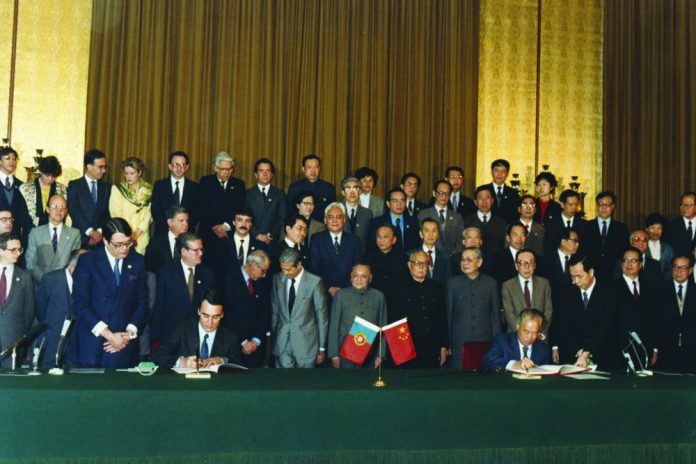The Basic Law of Macau, approved in March 1993, three years after that of Hong Kong, is, as renowned researcher Herbert S. Yee says, “largely a duplicate” of the original.
But, as noted by Professor of China University of Political Science and Law Jiao Hong Chang, “the two Basic Laws have different characteristics; in particular, as regards to the territorial scope of application. In addition, the Macau Basic Law has specific characteristics regarding the regulation of land matters, the deployment of military forces, rights and freedoms of residents, residence abroad, methodology for the organisation and formation of the Legislative Assembly, judicial organisation and oath of fidelity.”
As much as it is public, these differences – notably those concerning rights and freedoms (and which are the most visible) – did not result from Beijing’s imposition but from the manifestation of the delegates themselves in the Drafting Committee.
“Business elites have undoubtedly manipulated the electoral process in their attempts to dominate the political arena and further their own economic interests . . . The dominance of the pro-Beijing and pro-business sectors has significantly reduced the potential for the democratic forces in Macau to become a serious threat to the establishment.” we can read in Political Economy of Macao since 1999 – The Dilemma of Success, a book published by Macau based-scholars Yufan Hao (Dean of Faculty of Social Sciences), Li Sheng (University of Macau) and Guanjin Pan (Public Administration and Civil Service Bureau).
As is publicly known, Beijing designed a ‘One Country, Two Systems’ formula “to solve the problem of ruling Hong Kong after its reversion to China.” Former UMAC Professor Herbert S. Yee underlines the fact that the preamble of the Hong Kong Basic Law “stipulates that the People’s Republic of China adopts the principle of ‘One Country, Two Systems’ to maintain the ‘prosperity and stability’ of Hong Kong by ‘taking account its history and realities’.”
As Mr. Yee also points out, “the minor yet crucial changes” in the Macau document also take into account the ‘history and realities’” of Macau. One example is the fact that Macau Law gives the MSAR Chief Executive more power than his Hong Kong counterpart.
“It can be said that the Hong Kong joint declaration has somehow marked Macau’s own make-up and joint wording,” said Arnaldo Gonçalves, a former cabinet advisor to the Luso-Chinese Joint Liaison Group, and founder of Luso-Asian Forum [Fórum Luso-Asiático].
On 13 April 1988, the First Session of the Seventh Legislature of the People’s National Assembly decided to create the Basic Law Drafting Committee of the MSAR, which would be responsible for drafting the Basic Law before the National People’s Congress or before its Standing Committee, during the closing session of the Assembly.
The MSAR Basic Law Drafting Committee comprised members linked to various sectors, including residents of Macau, with the list of designated members defined and published by the Standing Committee of the National People’s Congress. In May 1989, the Drafting Committee of the Basic Law of the MSAR assessed and approved the rules of its operation, which were strictly adhered to during the drafting of the Basic Law of Macau.
“The two Basic Laws have different characteristics, in particular as regards the territorial scope of application” – Jiao Hong Chang
Following the drafting of the rules of the Basic Law a secret ballot was conducted in accordance with the voting rules of the respective Commission, the Preliminary Draft for Consultation of the Basic Law of Macau, the Draft Basic Law of Macau and the Basic Law of Macau. “The approval of this law by the National People’s Assembly observed the legal procedure established in the rules of appreciation of matters in the Assembly,” emphasises Professor Jiao Hong Chang.
“The similarity between the systematic structures of the Macau Basic Law and the Chinese Constitution is evident. The concept of the Macau Basic Law as a constitutional law undoubtedly contributes to deepening the knowledge of the principle ‘One Country, Two Systems’ to maintain the prevalence of this law and ensure its application in Macau,” adds Mr. Jiao.
 The green flag
The green flag
‘The regional flag of the Macau Special Administrative Region is a green flag with five stars, lotus flower, bridge and seawater,’ says the Basic Law (Chapter I, Article 10).
What was not known – and was revealed last year during a conference marking the 30 years of the Joint Declaration between China and Portugal – was that it was the Portuguese side who suggested the colour of the flag, as a way of perceiving, on the Chinese side, whether there was scope for negotiating issues other than those set for Hong Kong.
The Joint Declaration is in force
Paulo Cardinal said once that the Joint Declaration has been filed in the collective memory.
“If I remember well, I meant to underline that whereas the Basic Law has been popularised, publicised, constantly referenced by the government – as it should, I must say – we do not see the same effort regarding the Joint Declaration. Quite the contrary. And I [alluded] to the fact that the Joint Declaration was sort of precociously archived.”
The Macau constitutional law expert understands that “in doing so it’s like presenting a puzzle to solve, to apprehend the whole picture, but with one piece missing, absent.
“One can even argue that somehow it is like history being rewritten by deleting the Joint Declaration. As if the Joint Declaration would no longer be in force, when it is still very much so, as we well know. Even the central government, after an awkward/missed first step last year, declared the obvious: the Joint Declaration is in force.”
























